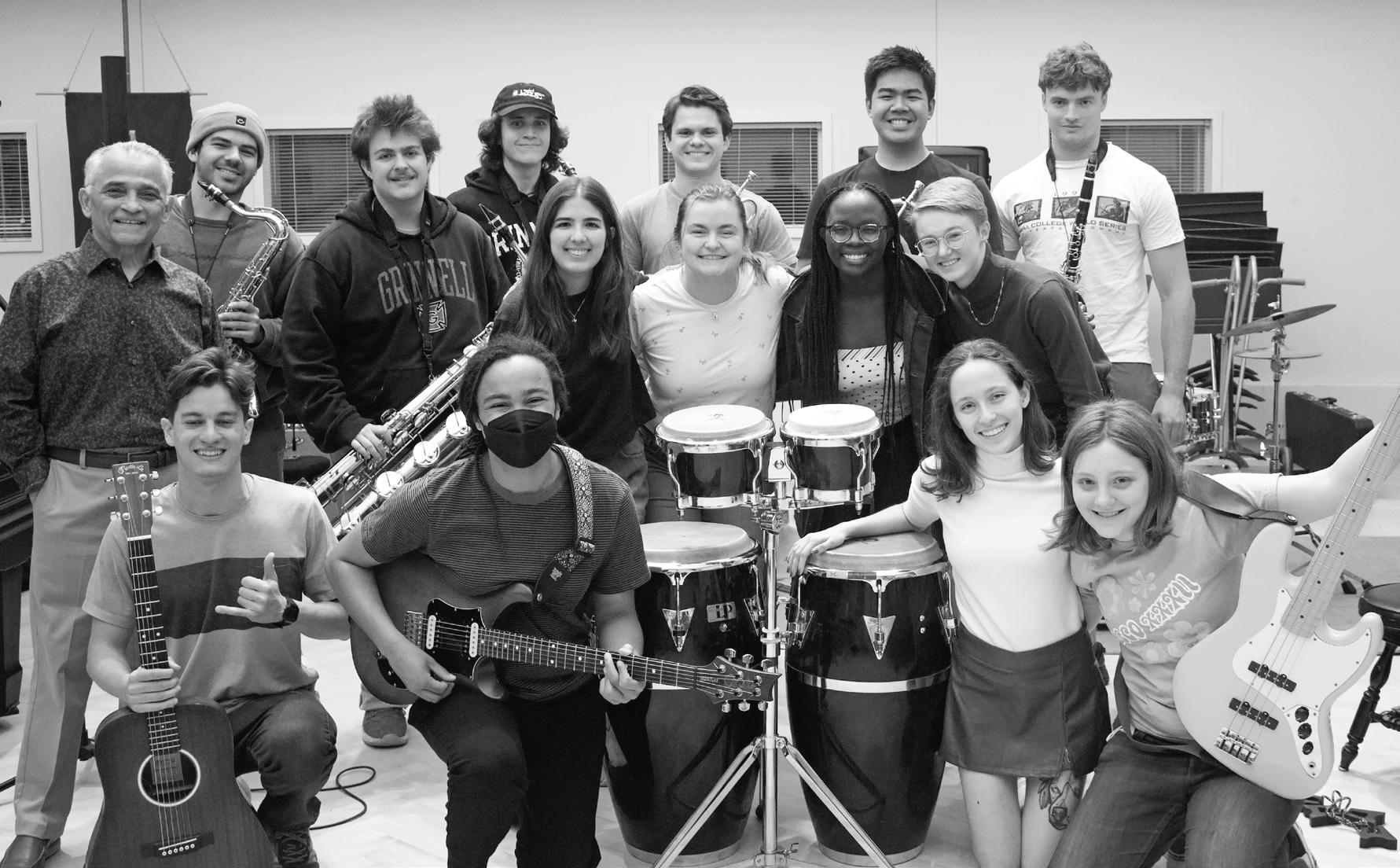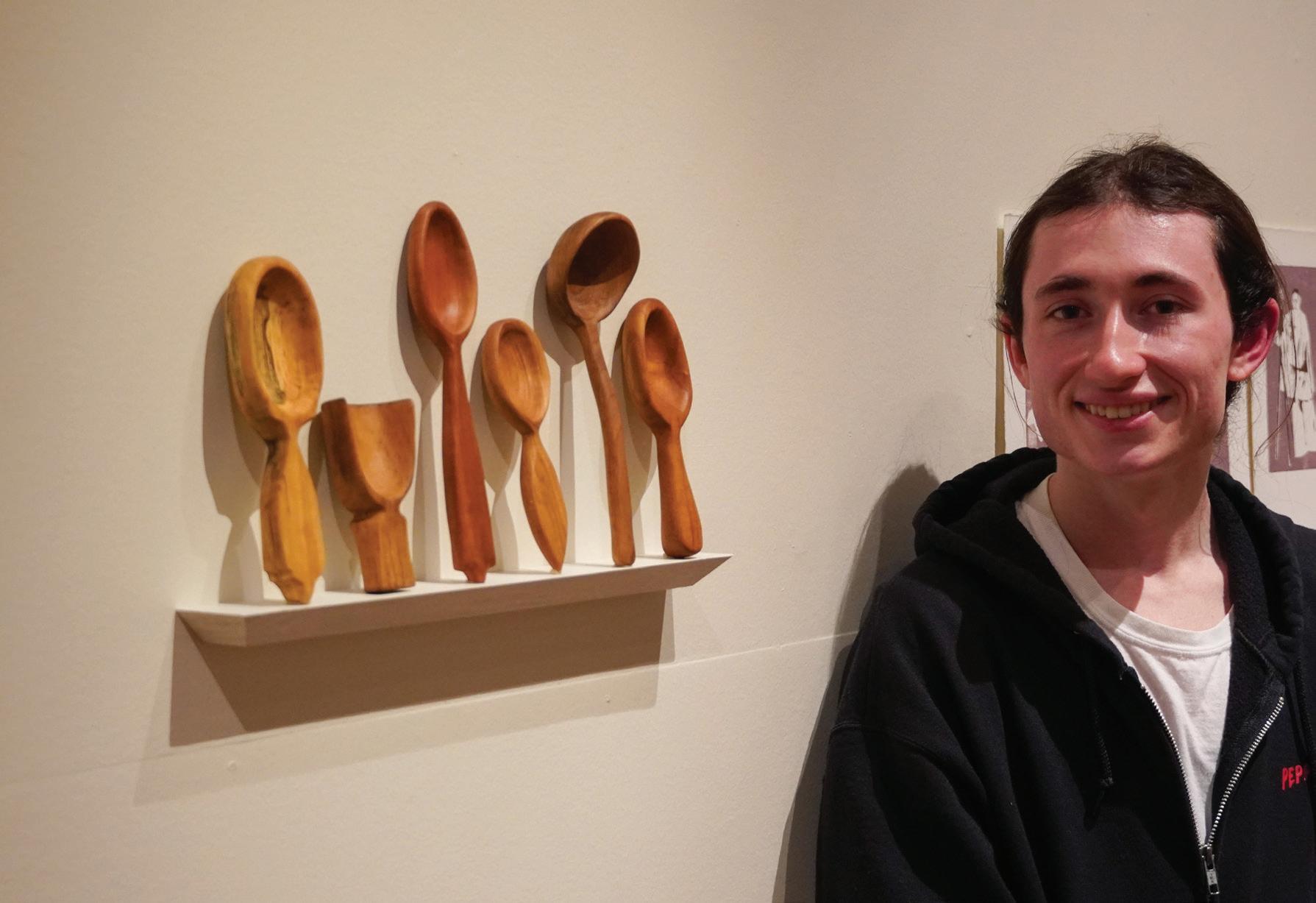
5 minute read
“The Glass Castle” in jeopardy after parent files complaint
By Conrad Dahm dahmconr@grinnell.edu
Imagine Grinnell, an organization based in Grinnell, Iowa, has a project to plant 1,000 trees in the city of Grinnell. The plan to plant these trees came after the August 2020 derecho, which knocked down around 35% of Grinnell’s canopy trees, according to Imagine Grinnell’s President, Tim Ellsworth.
Advertisement
“We lost probably 3,500 trees in just 10 or 15 minutes,” said Ellsworth. Following the loss of the trees, Imagine Grinnell wanted to start a project to plant more trees in Grinnell.
He said that Imagine Grinnell chose 1,000 trees to start with, and a grant was received to begin the project.
Ellsworth said that Imagine Grinnell does other things, such as help the environment and assist to create new job opportunities in town. Some of these things include a giving garden to help with food insecurity and numerous bike rides throughout the year, such as the annual Prairie Burn 100 bike ride.
ists, like Grinnell College alum Bel Kugel `20, planning the types of trees planted in order to ensure a diverse ecosystem of trees in Grinnell. With this help, he said that Imagine Grinnell started the process of planting 1,000 trees around the area.
“We have run into things we just didn’t know about. We’ve learned an awful lot, but what we’ve tried to do is get high-quality and diverse species of trees,” said Ellsworth.
Ellsworth said that there have been laws in Grinnell that limit the number of trees on a sidewalk, making the task more difficult. However, he also said that Imagine Grinnell has worked with the local government to change some of these laws and facilitate the process.
So far, the program has planted 627 trees and 250 saplings in the town of Grinnell.
Lindsey Starrett, a parent of a current Grinnell-Newburg High School (GHS) student, submitted a challenge form in early March 2023 contesting the suitability of the material for ninthgrade English classes. Walls’s memoir details the narrative of her dysfunctional family and struggles growing up in poverty — controversial subjects, such as child neglect and sexual assault, are present in the novel.
After the committee reviewing the material appointed a chairperson and secretary for the meeting and discussed the agenda, Starrett gave a brief speech covering the issues she saw with the text. Ranging from obscenities to rape culture, she listed over 10 contexts she considered age-inappropriate for high schoolers.
“Think about the fact that there are 14- and 15-year-olds reading this book,” Starrett said.
Starrett also took issue with what she said was an unequal learning substitution for the students who opted out of reading “The Glass Castle.” The memoir “Educated” was used as a substitute for her child. Starrett said there were not enough copies of the book provided to students wishing for an alternative, and many had to use an online PDF text. She also said these students were “just sent to the library” without any guidance in their learning.
Following Starrett’s opening that set up the ensuing discourse, 13 community members shared their opinions on altering the course curriculum, with the vast majority — 12 speakers — expressing beliefs against altering the curriculum.

A sophomore at GHS said the at- tempt to censor or change the learning material currently in use would only “silence Mrs. Walls and erase her story.” According to the student, reading this book in class allowed the possibility to see the realities of poverty.
“These issues are not going to go away by turning a blind eye to them,” the student added.
Loyal Terry `23 spoke during the public response open commentary to share what the possible censoring of a book meant to him. Terry said he “once aspired to live in this Grinnell community,” but due to a variety of reasons — including racial discrimination and this attempt to change the learning curriculum — he no longer sees living in Grinnell as a current possibility.
“This [is an] erasure of very real experiences to people across identity,” Terry said. “It is one of the reasons, unfortunately, I won’t consider staying in Grinnell.”
Three students addressed Starrett’s statements regarding alleged unfair teaching and grading for those students who did not participate in reading Walls’ memoir.
“We were given the option to skip the moments of sexual assault [in the book],” a freshman at GHS said.
This same freshman added that “banning books only serves one purpose — to promote ignorance.”
Despite this, Starrett reaffirmed that she had recently received an email notifying her that her daughter was failing the class where the book had been assigned despite being given an alternative learning assignment.
The committee spoke after the public response and answered questions from the audience.
One committee member, Kev- in Hosbond, the English department chair at GHS who teaches Walls’ book, pointed out that Starrett said she had done “a speed read” when asked whether she had read the book in its entirety. Hosbond stressed the importance of nuance and taking excerpts out of context when filing a complaint on a book.
“We need to read the whole book before we pass judgment,” Hosbond said.
Hosbond said in recent years, the English department at GHS has attempted to diversify its teaching materials. On a table in front of him, he pointed to a series of books previously taught at the school, and explained how most of them were authored by white men. According to him, books such as “The Glass Castle” have been integrated into GHS’s curriculum to provide a more complex, worldly narrative that students could relate to.
Both Hosbond and Kevin Seney, principal at GHS, answered questions from those in the audience concerned over the process of alternate learning assignments. According to Seney, a permission slip sent home to parents concerning the teaching of “The Glass Castle” is not current policy, but the department is attempting to solve any alleged issues with students being required to read the novel when either they or a parent disagrees with the content.
The S&B approached Starrett after the meeting to interview, but she declined to comment.
The committee will meet again on May 3 at 6:30 p.m. at Drake Community Library. Community members are permitted to attend until the deliberation process, which is closed to the public.
Imagine Grinnell purchases trees at a wholesale cost, plants them and takes care of the problems that may follow such as tree upkeep and maintenance, said Ellsworth. He also said that the organization acquires the permits associated with growing new trees.
President
Ellsworth said he did not have much experience with trees, but he said that he received help from arbor-
During the fall of 2022 and spring of 2023, Imagine Grinnell allowed residents of Grinnell to apply for a tree, which will then be planted by the organization. After applying for the trees, Imagine Grinnell will help plant the tree on the applicant’s property, but the owner of the property needs to ensure that they follow all city guidelines. After planting, the tree must be cared for long-term by the property owner. Ellsworth said that the long-term goal of the program is to have trees that will be alive for 50 or even 100 years. He also said that he hopes to plant the 1,000th tree this fall.
The funding for the project comes from multiple sources such as grants and private donations, Ellsworth said. He also said that many private citizens started to donate money, especially after seeing new trees in the city. So far, according to Ellsworth, Imagine Grinnell has spent almost $100,000 on trees. He also said that 49 trees are left to be financed, and people wanting to donate should visit their webite at www.imaginegrinnell.org. People also can sign up to be volunteers for Imagine Grinnell on their website.










